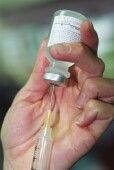Less-Frequent Glatiramer Acetate Dosing Well-Tolerated in MS: Results from the GLACIER Study
Patients with multiple sclerosis who received thrice-weekly injections of glatiramer acetate 40 mg/ml reported increased satisfaction with their treatment and experienced lower rates of moderate and severe injections site reactions and other adverse events.

Less-frequent dosing of a common injectable drug to treat multiple sclerosis (MS) resulted in a dramatic reduction in injection-related adverse events, according to a recent study comparing a daily and a thrice-weekly regimen. Though many patients with relapsing-remitting MS (RRMS) have experienced positive results with glatiramer acetate, symptom reduction and improvement in clinical outcomes has a price: The most common dosing regimen involves daily subcutaneous injection of glatiramer acetate 20 mg/ml (GA20).
Regimens with less frequent dosing have the potential to improve patient adherence and reduce the incidence of adverse events (AEs), according to Jerry Wolinsky, MD, of the University of Texas Health Science Center, Houston, Texas. He presented findings of the GLACIER trial of GA20 vs. GA 40 mg/ml three times weekly (GA40) at the 2014 Joint ACTRIMS-ECTRIMS Meeting, held in Boston, MA.
Enrollees in the GLACIER study had been treated with GA20 for at least six months, and stable on that regime for at least two months at the point of enrollment screening. Randomizing patients 1:1 to receive GA40 (n=108) or continue on GA20 (n=101), investigators compared the rate of injection-related AEs (IRAEs) between the two groups. Diary cards were given to subjects, who tracked all local injection-site reactions (ISRs) as well as overall occurrence and severity of IRAEs. Patients and raters were not blinded to treatment arm in this open-label study.
After a four-month core phase of the study, remaining subjects who had been randomized to GA20 (n=98) were given the opportunity to enter an extension phase and use GA40 for an additional four months. Remaining GA40 subjects (n=101) also continued for four more months. In addition to patient-reported assessments, investigators obtained baseline and periodic neurologic and general physical exams, ECG, and laboratory tests including biochemistry and hematology.
The study’s primary endpoint, reduction in the annualized rate of IRAEs with administration of GA40 compared with GA20, found a 50% reduction in the adjusted mean of the annualized IRAE rate for GA40 vs. GA20 (RR-0.50, 95% CI: 0.34-0.74, p=.0006). An endpoint added post hoc, reduction in the annualized rate of moderate and severe IRAEs for GA40 compared with GA20, found a 60% reduction for those receiving GA40 vs. GA20 (RR-0.40, 95% CI: 0.23-0.72, p=.0021). The GA40 group was less likely to have moderate or severe IRAEs and ISRs.
In his talk, Wolinsky referenced other findings from GLACIER that assessed patient perceptions of convenience. Patients expected before enrollment that the GA40 regime would be more convenient than GA20, and these expectations were confirmed by patient perceptions of increased convenience, according to questionnaires completed both soon after beginning GA40 and at the end of the study period. The Treatment Satisfaction Questionnaire for Medication-9 was used to assess patient perceptions of their medication experience.
The GA40 regimen, Wolinsky noted, is currently FDA-approved for RRMS and may offer patients who are seeking a treatment regimen with less frequent injections an alternative that may also result in a lower incidence of undesirable side effects.